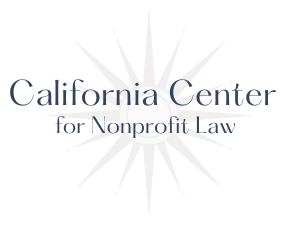
TD 9981: Final Regulations on Type I and Type II Supporting Organizations
The Internal Revenue Service (IRS) recently released TD 9981, which contains final regulations offering guidance on certain gifts or contributions to Type I and Type II supporting organizations from persons who control a supported organization.
The Internal Revenue Service (IRS) recently released TD 9981, which contains final regulations offering guidance on certain gifts or contributions to Type I and Type II supporting organizations from persons who control a supported organization. The purpose of these regulations is to reflect changes in the law resulting from the Pension Protection Act (PPA) of 2006. If you have questions about tax issues concerning your charitable organization or other related legal matters, contact the California Center for Nonprofit Law at (949)892-1221 today for legal advice and guidance.
Defining Supporting Organizations
Organizations that are tax-exempt under Section 501(c)(3) of the Internal Revenue Code (IRC) are classified as either public charities or private foundations. Public charities are described in either Section 509(a)(1), (2), or (3). Charities that fall under Section 509(a)(3) are known as “supporting organizations” because they provide support to one or more organizations under Section 509(a)(1) or (2), known as “supported organizations.”
Supporting organizations must satisfy four tests: an organizational test, an operational test, a relationship test, and a disqualified person control test.
Organizational and Operational Tests
Under these tests, a supporting organization must be “organized and operated exclusively for the benefit, to perform the functions, of, or to carry out the purposes of one or more supported organizations.”
Relationship Test
The relationship test requires that a supporting organization have one of three different types of relationships with one or more supported organizations, as follows:
· Type I – a supporting organization that is operated, supervised or controlled by one or more supported organizations, similar to a corporate parent-subsidiary relationship;
· Type II – a supporting organization that is supervised or controlled in relation to one or more supported organizations, in that the same persons supervise or control both organizations; or
· Type III – a supporting organization that is operated in connection with one or more supported organizations, subject to various restrictions put into place by the PPA.
Disqualified Person Control Test
The disqualified person control test requires that certain disqualified persons may not directly or indirectly control the supporting organization.
Summary of Revised Regulations
Defining “Control” Under Section 509(f)(2)
Section509(f)(2) prohibits Type I or II supporting organizations from accepting any gift or contribution from persons who “control” the governing body of the supported organization(s) described in Sections 509(a)(1), (2),and (4). Under the final regulations, a person has control over the governing body of a supported organization if they hold 50% or more of the total voting power of the governing body or the right to exercise veto power over the actions of the governing body. Furthermore, even if an individual does not have control by virtue of having 50 percent or more of the voting power of a veto power, all pertinent facts or circumstances will factor into the determination as to whether the individuals directly or indirectly controls the governing body of the supported organization.
Establishing Additional Rules and Requirements for Type III Supporting Organizations
Revisions and Clarifications to the Relationship Test
Under Section1.509(a)-4(i)(1), supporting organization must satisfy a notice requirement, responsiveness test, and integral part test for each taxable year. The final regulations make the following revisions and clarifications:
1. Notice Requirement
a. For NFI Type III supporting organizations, the description of support in the written notice must include all distributions described in Section 1.509(a)–4(i)(6) to the supported organization.
b. A supporting organization must deliver the required documents to each of its supported organizations by the last day of the fifth month of its taxable year after the taxable year in which it provided the support at issue.
2. Responsiveness Test
a. A supporting organization must be responsive to the needs and demands of each of its supported organizations.
3. Integral Part Test
a. A Type III supporting organization must meet the requirements either for a functionally integrated Type III supporting organization or for an NFI Type III supporting organization under Section 1.509(a)-4(i)(4) or (5).
i. Functional integration occurs if a supporting organization:
1. engages in activities substantially all of which directly further the exempt purposes of one or more supported organizations and otherwise meets the requirements described in paragraph (i)(4)(ii) of Section 1.509(a)-4(i)(4),
2. is the parent of each of its supported organizations as described in paragraph(i)(4)(iii) of Section 1.509(a)-4(i)(4), or
3. supports a governmental supported organization and otherwise meets the requirements of paragraph (i)(4)(iv) of Section 1.509(a)-4(i)(4).
ii. An organization is a NFI Type III supporting organization if it satisfies the distribution requirement of Section1.509(a)-4(i)(5)(ii) and the attentiveness requirement of Section 1.509(a)-4(i)(5)(iii)(or a pre-November 2, 1970 trust requirement).
1. A supporting organization must make distributions as described in Section 1.509(a)-4(i)(6) in a total amount equaling or exceeding the supporting organization’s distributable amount to satisfy the distribution requirement. The distributable amount is equal to the greater of 85% of an organization’s adjusted net income for the immediately preceding taxable year or its minimum asset amount for the immediately preceding taxable year, reduced by the amount of taxes imposed on the supporting organization during the immediately preceding taxable year.
2. The final regulations give further details on what distributions count toward the distribution requirement.
Call the California Center for Nonprofit Law Today
If you need legal advice or assistance, we are here to help. Contact an experienced nonprofit lawyer today. Call the California Center for Nonprofit Law offices at (949) 892-1221, email us at info@npolawyers.com, or contact us online for more information today. We offer a wealth of experience handling the unique legal issues that nonprofit organizations routinely face.
